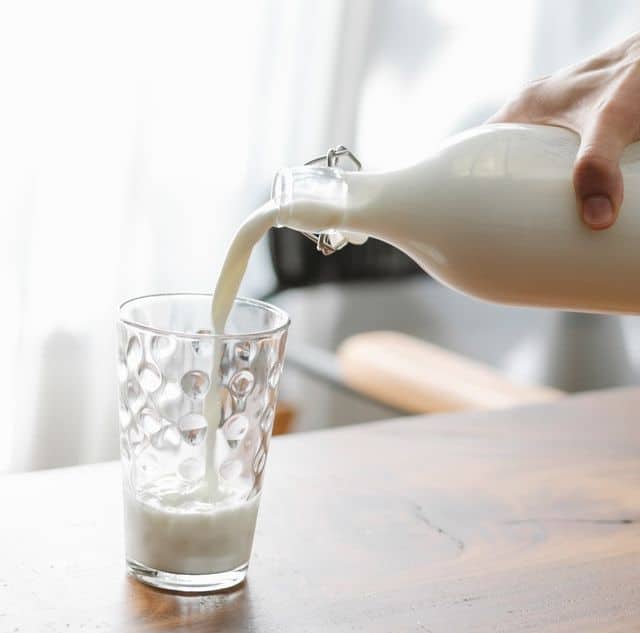Generally speaking, plant-based milks can be a healthy alternative to regular milk.
They contain less saturated fat (except for coconut milk, which is high in saturated fat) than regular milk. Unsweetened varieties typically contain less sugar when compared to regular milk. (Dairy milk contains lactose, the natural sugar found in dairy products).
Here are a few tips to consider when selecting plant-based milks:
- It is important to purchase the “unsweetened” version of a plant-based milk, versus the “original” or flavored versions, which usually have a lot of added sugars.
- Look for brands that offer just as much protein as regular milk per serving (1 cup of regular milk provides about 8 grams of protein). Adequate protein is important for helping us feel full and satisfied, and for supporting a variety of vital functions (including immune health, bone health, and maintaining our muscle strength as we age). Many plant-based milks (such as soymilk and pea protein-based milks) provide just as much protein as cow’s milk, and have just as much calcium, vitamin D, and vitamin B12.
- If you choose a plant-based milk without added vitamin D or calcium, be sure you’re getting these nutrients elsewhere in your diet (or from the sun for vitamin D!) to support optimal bone health. For those who eat exclusively plant-based (avoiding all animal products), it is especially important to look for products that have vitamin B12 added.
Gums in Plant-Based Milks
Gums are commonly added to plant-based milks to improve creaminess.
There has been some concern that gums such as guar gum, gellan gum, locust bean gum, and xanthan gum may contribute to gastrointestinal issues such as gas and bloating. Keep in mind that these side effects can be minimized by consuming small doses. If a gum is listed low on the ingredient list in a product, it is present in smaller amounts.
A few notes about different gums:
- The Environmental Working Group has not identified any concerns related to adding gellan gum to foods.
- According to the Natural Medicines Database, high doses of guar gum may cause adverse gastrointestinal effects such as abdominal cramps, abdominal pain, bloating, diarrhea, gas, heartburn, and loose stools.
- There is evidence to suggest xanthan gum may cause gas and abdominal distension for some individuals, according to the Natural Medicines Database.
- Locust bean gum appears to be generally well-tolerated when consumed in amounts commonly found in food.
If you struggle with digestive issues, it’s important to be mindful of foods consumed and symptoms experienced, and work individually with a qualified healthcare provider.
The Carrageenan Controversy
Carrageenan is a food additive extracted from seaweed. It is commonly used as a thickener and emulsifier to improve the texture of a variety of food products including some milks (such as soy milk), ice cream, yogurts, and other foods. There is currently significant controversy surrounding carrageenan’s safety.
Researchers have suggested that the Food and Drug Administration (FDA) ban carrageenan due to studies that have linked this food additive to digestive diseases (inflammatory bowel disease, stomach problems, intestinal lesions, etc.), inflammation, and even cancer (such as colon cancer).
Joanne K. Tobacman, MD, has published multiple peer-reviewed studies finding that all forms of carrageenan are harmful. Dr. Tobacman has found through her research that exposure to carrageenan in amounts commonly found in processed foods may cause inflammation in the body. A report by the Cornucopia Institute, a food and farm policy watchdog group, made a strong case for banning carrageenan.
The FDA has rejected requests to ban this additive, citing studies that have not found carrageenan to have harmful health effects. The FDA also pointed out that many of the studies suggesting harm have been done in animal models, not humans.
The Environmental Working Group has not identified concerns for carrageenan in food. Natural Medicines Database has identified carrageenan to be safe when used orally in the amounts commonly found in foods. Officially, carrageenan is in the category known as “Generally Recognized as Safe” (GRAS) in the US. The debate regarding carrageenan’s safety continues.
Given that this food additive does not contribute to the nutritional value of a product or improve taste, safety, or shelf life, this begs the question: Is it worth any potential risk to add this questionable additive to our food? Many food companies have removed carrageenan in response to consumer concern about its potential harmful effects. If you’re concerned about carrageenan in your food, be sure to eat less processed foods and more real, whole foods (which naturally do not contain this food additive) and read food ingredient labels to flag the presence of carrageenan. Those with digestive issues—especially inflammatory bowel disease—may want to steer clear of this food additive.
DOWNLOAD FULL eBOOK: Plant Based Meats and Milk: Just How Healthy Are They?



 Crystal Pace
Crystal Pace 

